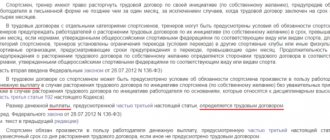So, what is maternity leave?
Maternity leave in Russia is called maternity leave. Often this concept also includes parental leave for up to three years. If a woman is on maternity leave - that is, she is expecting a child or has recently given birth - she may not go to work or work less than other employees, receive benefits, take leave without waiting and refuse business trips. The employer is obliged to create comfortable conditions for her and provide more guarantees.
This analysis will be useful for mothers with employment contracts - save the table with links to laws to make the most of your rights.
There is also useful information here for men: both parents can apply for leave and child care benefits. If you are an employer and you have parents of small children on your staff, study this analysis so as not to accidentally violate rights and not run into huge fines.
New impressions or how to return to work after maternity leave
If a woman returns from maternity leave full-time, even early, child care benefits are terminated. Benefits are paid only in case of part-time work until the child reaches 1.5 years of age.
There is a second option, perhaps the most beneficial for the employee herself. Here it is necessary to agree with the employer on dismissal by agreement of the parties or upon the fact of layoff. In this case, when a woman joins the labor exchange, she will receive higher amounts of unemployment benefits.
Take a regular vacation without a queue..
BASE. Labor Code of the Russian Federation Art. 125, art. 126, art. 260
HOW IT WORKS.
Women on maternity leave may go on vacation unscheduled. A vacation schedule is a plan that states which employees go on vacation and when during the year. It is drawn up in December, agreed upon with everyone who works in the company, and approved by order of the manager.
If one of the employees wants to go on vacation outside of the schedule, he will have to negotiate with the employer. He may agree and let the employee rest, or he may disagree - and he will be right. You will have to take vacation on the days indicated in the schedule.
This is not the case for pregnant women and women with small children: the law allows them to go on vacation unscheduled and without the consent of the employer. But there is an important condition: this leave must be before or immediately after maternity leave. In this way, you can prepare for the birth of your child or care for him at home longer - for at least 28 days. And all this time the woman will be paid - by the state or the employer.
THERE ARE THREE OPTIONS WHEN YOU CAN TAKE A REGULAR VACATION:
1) before maternity leave, which is given on the basis of sick leave;
2) after maternity leave - before going to work or parental leave;
3) after maternity leave.
If you choose the second option, you can lose almost a month of benefits, which is 40% of your salary. The law does not allow you to be on two vacations at once—regular and parental leave. Therefore, benefits will begin to be paid only after regular vacation. This option is suitable for those who want to go to work after giving birth.
FOR EXAMPLE, a child is born in a family. His father decided to take leave to care for him: it’s possible. 70 days after giving birth, the mother’s sick leave for pregnancy and childbirth ends. From the next day, the father takes out parental leave, and the mother takes out annual leave. She may not go to work for another 28 days and receive her average salary. Both parents will be able to be with the child for almost another month, they will not be fired and will be paid.
A more common option: the child turns 3 years old, it’s time for the mother to go to work. Children can only be admitted to kindergarten from the age of three. The mother takes regular leave immediately after maternity leave, calmly collects all the documents and helps the child get used to the new conditions.
The good thing about this annual leave is that you can take it in advance. If a woman just got a job or has taken all the required days off, she will still be given the full amount of leave. True, then you will have to work longer for the next regular vacation. Here it is better to consult with a personnel officer and consider different options.
Usually, in order to take annual leave, you need to work for the company for at least six months. For leaves that pregnant women and employees with children under three years of age want to take along with maternity leave, there is no such rule - leave can be taken earlier.
Pregnant women also have other benefits: the employer does not have the right to call them back from vacation. He can call ordinary employees with their consent if deadlines are running out, there are not enough people, or an inspection has come. But pregnant women cannot even be asked to do this: they must rest.
Pregnant women cannot replace vacation with monetary compensation. They must take all of their main and additional vacations.
Yulia Zhizherina, a business consultant on personnel management and labor law, tells how to help an employee get back to work faster after maternity leave and what conditions she needs to provide.
For the company, an employee is interesting from the point of view of the results he brings. However, in every person’s life there is more than just work. Therefore, the state provides various guarantees to employees who have children. Labor legislation provides for maternity leave and parental leave. After a vacation, the woman returns to the company. At this moment, it is important for the employer not to forget some legal and psychological issues related to the employee’s return from maternity leave.
Provide guarantees according to technical regulations
Various conditions around an employee on maternity leave may change, but not her working conditions. According to Art. 256 of the Labor Code of the Russian Federation, during the period of parental leave, the employee retains his place of work (position). This means, firstly, that this position cannot be reduced, which is directly provided for in Art. 261 Labor Code of the Russian Federation. That is, no matter what changes are made to the organizational structure and staffing of the position, it is impossible. Also, a woman on maternity leave cannot be transferred to any other position without her consent (Article 72.1 of the Labor Code of the Russian Federation). To make any changes, you must wait until the woman returns from maternity leave. And for reduction - the child reaches 3 years of age.
Labor legislation provides women with a child under 3 years of age with the following guarantees:
- The company cannot engage women with children under 3 years of age to work at night, to work overtime, to work on weekends and non-working holidays, or to send them on business trips without the woman’s consent and if there are medical contraindications. At the same time, women must be informed in writing of their right to refuse such work (Article 259 of the Labor Code of the Russian Federation).
- The company is obliged to transfer a woman who has children under the age of one and a half years, upon her application, to another job if she cannot perform the previous one. In this case, wages must be paid according to the work performed, but not lower than the previous average earnings (Article 254 of the Labor Code of the Russian Federation).
- The company is obliged, at the request of a woman, to provide work on a part-time basis or at home while on maternity leave, while maintaining the right to receive state social insurance benefits (Article 256 of the Labor Code of the Russian Federation). In this case, the choice of whether it will be part-time work or work from home is determined by agreement of the parties and based on the specifics of the work. For example, a cashier or salesperson will not be able to serve customers from home.
- The company is obliged to provide women with children under the age of one and a half years, in addition to breaks for rest and food, additional breaks for feeding the child at least every three hours, lasting at least 30 minutes each. At the same time, at the request of the woman, breaks for feeding the child can be added to lunch or, in aggregate form, transferred to both the beginning and the end of the working day.
Complete the necessary documents
Basic documents when leaving maternity leave:
- an employee’s statement about returning to work indicating a specific date;
- an order that the employee is considered to have started work.
Documents may also be required regarding employees performing maternity duties:
- an order to dismiss an employee who worked in this position during the absence of the employee under a fixed-term employment contract;
- an order to cancel the combination of positions/professions, dismissal of an internal part-time worker (if colleagues distributed the work of a maternity worker among themselves).
Documents that are needed if the employee decides to take advantage of the guarantees provided:
- an additional agreement to the employment contract and an order to establish part-time work or work from home;
- an additional agreement to the employment contract and an order on the time of feeding breaks or a statement on refusal of feeding breaks.
Adapt
If a woman has been absent for a long time, then such significant changes may occur in the company that it can be considered that the woman has arrived at a new place of work. Due to personnel mobility, her environment may change significantly. Management, company strategy, corporate culture, algorithms for performing job duties, staffing, and bonus systems may change. In such a situation, the woman will be disoriented when going to work. The employer’s task is to make the adaptation process as gentle as possible in compliance with legal standards.
The process of adaptation of an employee after leaving maternity leave is influenced not only by the length of time on leave, but also by other factors, for example, the level of the position held.
If the work of an ordinary employee is more often associated with the implementation of algorithms established by the company, then the work of a manager involves not only knowledge of the algorithms, but also an understanding of the company’s strategy, maintaining relationships with related departments, as well as managing subordinates.
In addition, a woman’s personal attitude is important. It happens that the birth of a child causes a person to completely rethink his life. Sometimes women lose interest in career growth and work only for financial success, and focus all their interests on the baby. But it also happens the other way around, when a woman realizes that motherhood is not as interesting to her as building a career, and begins to study her profession with renewed vigor, using the time of maternity leave to improve her skills.
An obvious mistake would be to assume that a woman can handle it herself and doesn’t need to do anything. Adaptation of an employee who returns to work from maternity leave should be planned taking into account the life situation of the individual woman and should include the following steps:
Step 1. Diagnosis of the situation and identification of needs
Talk with the employee to understand the situation and identify conditions that will facilitate or hinder adaptation.
Step 2. Preparation of the leader
Talk to the returning employee's manager to help him adjust to the new circumstances. He has already gotten used to working without her, redistributed responsibilities among other employees, established the necessary relationships, and now he will have to change everything again.
Try to structure the conversation so that the manager expresses all his concerns, and provide him with support when discussing possible pitfalls.
Step 3. Development of an adaptation plan
If the company has a standard adaptation plan for a given situation, use it, but with the necessary modifications and changes for the specific situation. If there is no such plan, then you can take the adaptation plan form for new employees and, on its basis, develop an adaptation plan for an employee who has started work after maternity leave.
In terms of adaptation, it is worth considering the following points:
- tell us about changes in the company, introduce new or updated local regulations;
- Schedule a conversation with your immediate supervisor and discuss the draft adaptation plan with the woman;
- organize a meeting with the team and meet new people;
- help the employee update her knowledge about job responsibilities, algorithms for their implementation, algorithms for interaction with other employees, and so on;
- Plan regular meetings with your immediate supervisor and HR manager to discuss the adaptation process and adjust it if necessary;
- include the employee in your staff training plans.
As practice shows, it makes sense to draw up an adaptation plan for at least the first month, and emphasize certain points in the future for 3 months. This is usually enough time for the employee to adapt to the changes or realize that the job is no longer suitable for her.
Provide psychological support
A person cannot suddenly change his lifestyle. Therefore, you should not expect that yesterday’s maternity leave, all of whose thoughts were focused on the baby, will achieve good results in the first week of work. We need to give her time to adjust to her working life.
If the work involves performing operations and algorithms, then the volume and number of operations should be gradually increased. If this is project work, then it is recommended to first involve the employee in one project with the completion of simple tasks and not assign independent projects at first.
Keep in mind that if an employee has breaks for feeding, then in general her working hours will decrease and she will not be able to cope with the full workload. Therefore, it makes sense to delegate some responsibilities to other employees.
A woman in this situation needs psychological support. If the company has a psychologist, it’s time to refer the employee to him. In addition, an HR manager (among them many people with psychological education or with extensive experience communicating with people), as well as the immediate supervisor, can provide some assistance.
Involving a woman in social life can also help speed up adaptation. Don't forget to remind her about the corporate portal and information boards where the life of the company is covered, inform her about seasonal events, competitions and events in which she could take part. The main thing is to make sure that the person does not withdraw into himself and family problems and does not find himself without the support of the team. Then the former maternity leaver will bring a lot of benefit to the company.
Author: Yulia Zhizherina
Do not take leave for childbirth and childcare.
BASE. Labor Code of the Russian Federation Art. 255, article 256 part 1
HOW IT WORKS.
It happens that the peculiarities of work allow a woman to continue it both in the ninth month and after the birth of the child. Or circumstances develop in such a way that it is impossible to lose your earnings and leave your job. The law does not prohibit a pregnant woman from continuing to work before and immediately after childbirth and receiving her usual salary.
Going on maternity leave is a woman’s right, not an obligation. Working is also her right. It is up to her to decide which of these rights to exercise. Leave for both pregnancy and child care is issued only at the request of a woman - if she herself wants it. No application - no vacation.
It is not necessary to issue sick leave for pregnancy and childbirth. But even if it is issued for 140 days, a leave application can be written for 128 days, 50 days or 3 days: the period can be anything within the limits provided for by the labor code. The benefit will also be paid only for the days upon application.
FOR EXAMPLE, a company accountant is expecting a child. She has a comfortable office, feels good, and her husband drives her to work. It is not profitable for an accountant to go on maternity leave: a year ago she worked as an individual entrepreneur without registering with the Social Insurance Fund, so during maternity leave she will receive less than her usual salary.
An employee has the right to work until the birth: still be at work on Friday, and go to the maternity hospital on Monday. After giving birth, she can work remotely - at least a week after discharge.
In two months, the grandmother will take care of the child, and the accountant will go to work. No one can force her to go on maternity leave if the woman herself has other plans: perhaps she does not want to lose her qualifications and money, or her presence at work is important for the family business.
It also happens that in a family the father or grandmother takes care of the child. Only women can take maternity leave, but any family member has the right to care for a child and receive benefits for up to one and a half years. A mother does not have to leave work and lose income if a loved one is taking care of the child.
Returning to work after maternity leave - we act strictly according to the law
The Labor Code describes all the features of the labor legislation of the Russian Federation, which applies to both pregnant women and young mothers. The document says that a woman only needs to present her employer with a certificate of incapacity for work issued by a gynecologist and write a statement in order to go on maternity leave. These papers are sufficient to apply for leave for the prenatal and postpartum periods. The organization issues a maternity leave order. The woman signs it and says goodbye to the company for a while, during which her workplace remains hers (Article 256 of the Labor Code).
The return of a happy mother to her old workplace after maternity leave in most cases is carried out without the need to notify the employer about this fact. The procedure for entering the service itself can be formalized in different ways. It all depends on the reason for the woman’s return to her job duties and the type of leave.
We recommend reading: At what age can you apply for elderly care?
Leave maternity leave whenever you want...
BASE. Letter of Rostrud dated May 24, 2013 No. 1755-TZ, Labor Code of the Russian Federation Art. 256
HOW IT WORKS.
Maternity leave does not have to be taken until three years. You can leave it earlier: when the child turns one and a half years old and they stop paying benefits, when a place opens up in kindergarten, you want to change the environment or earn money. It doesn’t matter what date is on the vacation application: a woman can leave it at any time.
During an employee's maternity leave, her position will be reserved for her. If a new employee is hired for this position, he will have a fixed-term employment contract. As soon as the woman wants to go to work, this contract will end. Therefore, there will be a place for it in any case.
Work less than others...
BASE. Labor Code of the Russian Federation article 93 part 2, Labor Code of the Russian Federation art. 258
How it works.
Pregnant employees and working mothers may work less than standard hours. This is often called part-time work. To work less, you need to write an application addressed to the employer: he cannot refuse this mode of work, but the conditions must be agreed upon.
PREGNANT WOMEN AND MOMS CAN CHOOSE TWO OPTIONS:
a) arrange a short working day - come to work later, leave earlier or increase lunch time;
b) switch to a short work week, for example working four days rather than five.
If you work less, it will affect your salary. It decreases in proportion to the time worked: if you worked 30 hours instead of 40, you received 75% of your salary. But the woman will be less tired or, for example, will have time to pick up the child from kindergarten. The employer cannot tell the mother that her position does not allow for part-time work. If he does this, it will be a violation of rights and cause for a fine.
Women have the right to work part-time until their child turns 14. They work less, but also earn less. That is, any mother who has a child under 14 years of age has the right to leave work early or sometimes not come at all.
Mothers of very young children have an additional benefit: until the child is one and a half years old, you can reduce your working day by taking breaks for feeding. This is more profitable, since the employer pays breaks for feeding in the amount of average earnings. The Labor Code sets the standard - breaks of 30 minutes every three hours. With an eight-hour workday, that's two breaks per day.
You can not split the day into these breaks, but combine them and add them to lunch, the beginning or end of the working day. That is, mothers of children under one and a half years old can work an hour less every day and not lose money. If there are several children under one and a half years old, each break is increased to an hour, that is, a full working day can be reduced by as much as two hours. This will not affect your salary.
The employer must provide feeding breaks without application. But in order to transfer them to the beginning or end of the working day, an application is necessary.
For example, after maternity leave, a woman goes back to work. The child is not yet one and a half years old, and the employer must include breaks for feeding in the working day. Typically, a woman’s working day is from 8:00 to 17:00, lunch is from 12:00 to 13:00. By default, breaks will be distributed as follows: the first - from 11:00 to 11:30, the second - from 14:30 to 15:00.
It turns out that between the first feeding break and the lunch break there is only half an hour. To make the schedule less irregular, a woman can ask to move both breaks to the end of the working day - and leave work at 16:00.
It does not matter whether the mother feeds the baby with breast milk or formula. Even fathers and guardians are given breaks for feeding if they are raising a child alone, without a mother.
Reduce stress and increase comfort in the workplace.
BASE. Sanpin 2.2.0.555-96 section. 4, Labor Code of the Russian Federation, article 254 part 1
HOW IT WORKS.
Pregnant women should work in comfortable and safe conditions. They cannot be overloaded, forced to work in one position, and there cannot be harmful radiation nearby. The employer is obliged to provide these conditions.
FOR EXAMPLE, if a pregnant accounting employee has a regular chair, it needs to be replaced with a swivel one with armrests.
If it is not possible to create comfortable working conditions, you should be given another job during pregnancy. For example, temporarily transfer the salesperson to the position of secretary, and the warehouse manager to the accounting department.
If there is no suitable position, the pregnant woman should be released from work. All this time she will be paid the average salary for her main position.
In order for an employer to transfer a woman to another job or change her working conditions, a medical certificate is required. Pregnancy is different for every woman, and only a doctor can determine what load is safe for the unborn child. Therefore, if a woman feels that working has become difficult, she should ask the doctor managing the pregnancy for a certificate with recommendations on working conditions. Without a medical certificate, the employer is not obliged to make it easier for a pregnant woman to work.
Employers do not always take care of pregnant employees. Then you can protect your rights through court.
FOR EXAMPLE, one pregnant woman worked as a salesperson in a cosmetics store. In the medical report, the doctor wrote that she was prohibited from constantly working standing, sitting or without natural light. The pregnant woman asked to be transferred to another job, since the salespeople cost a lot, and the hall smelled strongly of perfume. The employer agreed, but did not provide all the conditions: one place was also in the sales area, and the other was without natural light.
The pregnant woman refused to work in such conditions and went to court. The court found: perfumes are industrial aerosols and are harmful for pregnant women. They cannot work in rooms without windows.
Get a job without a probationary period...
BASE. Labor Code of the Russian Federation article 70 part 4
HOW IT WORKS.
Pregnant women and mothers of children under the age of one and a half years can get a new job without testing. That is, even if the employer has provided a probationary period for all employees, these women must be immediately hired as core employees.
The main consequence of this rule is that pregnant employees and women with children under one and a half years old cannot be fired due to failure to pass the test. If the employer writes such a condition into the contract, it will be invalid. If a woman becomes pregnant during the probationary period, the contract with her immediately becomes permanent.
FOR EXAMPLE, a woman got a job with a probationary period of three months. Two months later, she found out that she was pregnant, took a doctor’s certificate, brought it to her employer - and from that moment on she was a permanent employee. An employer cannot fire a woman until her maternity leave ends. Even if two months later it became clear that the employee was not suitable for this position.
Maternity leave for work
For pregnant women, in accordance with a medical report and at their request, production standards and service standards are reduced, or these women are transferred to another job that eliminates the impact of adverse production factors, while maintaining the average earnings for their previous job.
It is permissible to dismiss a woman due to the expiration of an employment contract during her pregnancy, if the employment contract was concluded for the duration of the duties of an absent employee and it is impossible, with the written consent of the woman, to transfer her to another job available to the employer before the end of her pregnancy (as a vacant position or a job corresponding to the woman’s qualifications, and a vacant lower-level position or lower-paid job), which a woman can perform taking into account her state of health. In this case, the employer is obliged to offer her all the vacancies that he has in the given area that meet the specified requirements. The employer is obliged to offer vacancies in other localities if this is provided for by the collective agreement, agreements, or employment contract.
Save your job when laying off...
BASE. Labor Code of the Russian Federation Article 261 parts 1 and 4
HOW IT WORKS melts.
Pregnant women and mothers on maternity leave cannot be fired. The only reason why they can lose their job is the liquidation of the company or the closure of the individual entrepreneur. If a company plans to downsize, maternity positions are protected by law. The employer may offer the woman on maternity leave to take another position, but if she refuses, she will have to keep her previous job.
A woman cannot be fired while she is pregnant, on maternity leave or parental leave for up to three years. Only after she returns from maternity leave will the employer be able to fire her by paying her severance pay.
Women who work and simultaneously care for a child have the same guarantees - they cannot be reduced until the child is 3 years old. But they can be fired for gross disciplinary misconduct. Pregnant women are also protected from this - they can not come to work, accumulate reprimands and retain their job until they go on maternity leave.
The company has no right to insist on its own version of the operating mode
An employee can choose a part-time work schedule that is convenient for her. You cannot influence her decision. After all, it is the employee’s right to work during the vacation period. This means that she herself determines the conditions of her work. This conclusion was reached by the Presidium of the Perm Regional Court (review of the judicial practice of the Perm Regional Court for the first half of 2015 dated September 11, 2015). Therefore, you should not impose your working conditions on the employee on a part-time basis. Explain to her why you are proposing a different schedule. It is possible that the employee will meet you halfway. This way the conflict can be resolved peacefully.
True, if it is impossible to provide the employee with a schedule on the terms she requires, then you are not obligated to do this. In this case, the employee will have to choose another option (appeal ruling of the Moscow City Court dated October 16, 2014 in case No. 33-35065).
In addition, during the period of maternity leave, the employee has the right to work from home (Part 3 of Article 256 of the Labor Code of the Russian Federation). But not every job can be done from home. For example, driving vehicles, delivering orders, visiting clients, etc. In this case, explain to the employee that, given the specifics of the company, she needs to work in the office. The courts are on the side of employers. They believe that work from home should be provided only when it can be done (appeal rulings of the Moscow City Court dated September 22, 2014 in case No. 33-23961 and dated August 4, 2015 in case No. 33-27277).
Extend a fixed-term employment contract until the end of maternity leave.
BASE. Labor Code of the Russian Federation Article 261 part 2 and 3
HOW IT WORKS.
The fixed-term employment contract states when it ceases to be valid. This could be a specific date, for example June 21, 2020, or a period - say, three years from the date of conclusion of the contract. Once this date occurs, the employee may be fired. But not a pregnant woman.
A fixed-term contract with pregnant women is extended until the end of maternity leave. If a woman does not want to go on such leave, then the contract is valid until the end of pregnancy. The contract does not become indefinite; the dismissal is simply postponed so as not to deprive the woman of benefits during pregnancy and childbirth.
A common case of fixed-term contracts is contracts for the duration of another employee’s maternity leave. The main employee may leave maternity leave suddenly, so the employer may simply not have another position for a pregnant woman. Therefore, there is a different procedure - and a pregnant woman can be fired.
First, the employer must offer the pregnant woman replacing the maternity leave another vacant position in the company. That is, a pregnant woman may lose her job if the company does not have free places where she can move for a while, or if there are places, but they are not suitable for her. If she agrees to the transfer, she can work until the end of her pregnancy and receive maternity benefits.
FOR EXAMPLE, an employer has one secretary on staff. A woman who worked as a secretary went on maternity leave. Another employee was temporarily hired in her place. A year later she became pregnant, and four months later the main employee decided to return to work.
The employer does not have the position of a second secretary, but there is a vacant position of a watchman. Now a pregnant woman needs to decide: either work as a janitor until the 30th week of pregnancy and take sick leave, or quit and lose the right to benefits.
How to calculate wages and benefits?
If a pregnant employee brought a certificate of incapacity for work to work, but does not yet want to leave, but remains at the workplace as usual, then this creates an ambiguous situation. The manager may, on the one hand, not give her the money she earned, because... the woman is on maternity leave and is entitled to benefits. On the other hand, the employee stays at the enterprise and copes with her job responsibilities.
The correct answer is that if a woman has maternity leave, then she is entitled only to her legal payments, but not wages. In this case , the boss and the subordinate can agree that she will be given an additional payment for performing her labor functions at the enterprise on maternity leave.
If the manager does not agree with this situation, then the employee will still have to go on vacation. If the employee has not provided sick leave for a period of thirty weeks, then she is entitled to a salary until the moment when she decides to submit this document.
If the enterprise issues this application retroactively and equates it with the date when the sick leave was drawn up, then this is considered a violation of the rights of a pregnant woman, which may be the reason for proceedings in court.
Important! Maternity payments are transferred from the moment the employee’s wages are completed.









